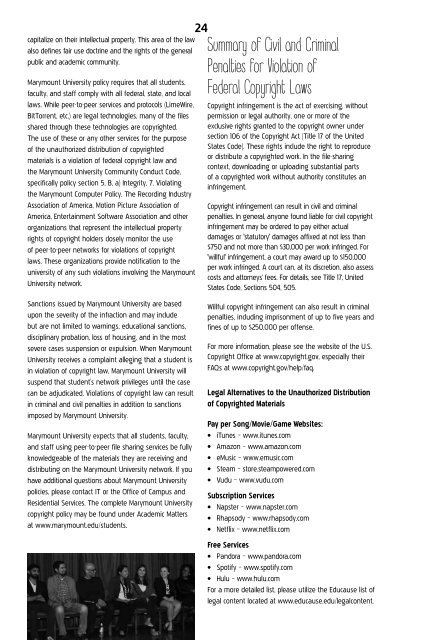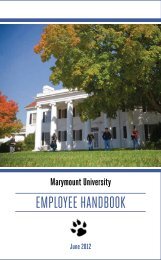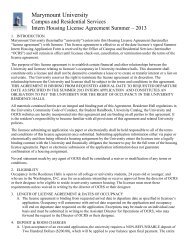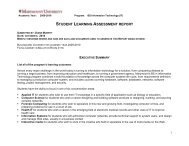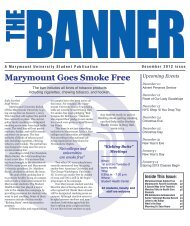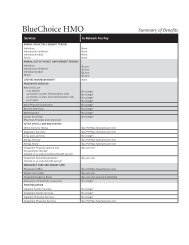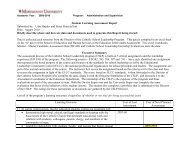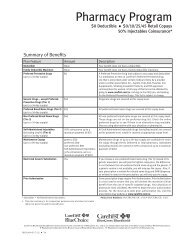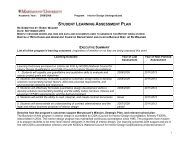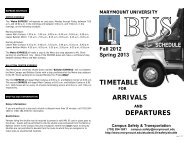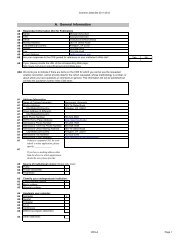Student Handbook - Marymount University
Student Handbook - Marymount University
Student Handbook - Marymount University
You also want an ePaper? Increase the reach of your titles
YUMPU automatically turns print PDFs into web optimized ePapers that Google loves.
capitalize on their intellectual property. This area of the law<br />
also defines fair use doctrine and the rights of the general<br />
public and academic community.<br />
<strong>Marymount</strong> <strong>University</strong> policy requires that all students,<br />
faculty, and staff comply with all federal, state, and local<br />
laws. While peer-to-peer services and protocols (LimeWire,<br />
BitTorrent, etc.) are legal technologies, many of the files<br />
shared through these technologies are copyrighted.<br />
The use of these or any other services for the purpose<br />
of the unauthorized distribution of copyrighted<br />
materials is a violation of federal copyright law and<br />
the <strong>Marymount</strong> <strong>University</strong> Community Conduct Code,<br />
specifically policy section 5, B, a) Integrity, 7. Violating<br />
the <strong>Marymount</strong> Computer Policy. The Recording Industry<br />
Association of America, Motion Picture Association of<br />
America, Entertainment Software Association and other<br />
organizations that represent the intellectual property<br />
rights of copyright holders closely monitor the use<br />
of peer-to-peer networks for violations of copyright<br />
laws. These organizations provide notification to the<br />
university of any such violations involving the <strong>Marymount</strong><br />
<strong>University</strong> network.<br />
Sanctions issued by <strong>Marymount</strong> <strong>University</strong> are based<br />
upon the severity of the infraction and may include<br />
but are not limited to warnings, educational sanctions,<br />
disciplinary probation, loss of housing, and in the most<br />
severe cases suspension or expulsion. When <strong>Marymount</strong><br />
<strong>University</strong> receives a complaint alleging that a student is<br />
in violation of copyright law, <strong>Marymount</strong> <strong>University</strong> will<br />
suspend that student’s network privileges until the case<br />
can be adjudicated. Violations of copyright law can result<br />
in criminal and civil penalties in addition to sanctions<br />
imposed by <strong>Marymount</strong> <strong>University</strong>.<br />
<strong>Marymount</strong> <strong>University</strong> expects that all students, faculty,<br />
and staff using peer-to-peer file sharing services be fully<br />
knowledgeable of the materials they are receiving and<br />
distributing on the <strong>Marymount</strong> <strong>University</strong> network. If you<br />
have additional questions about <strong>Marymount</strong> <strong>University</strong><br />
policies, please contact IT or the Office of Campus and<br />
Residential Services. The complete <strong>Marymount</strong> <strong>University</strong><br />
copyright policy may be found under Academic Matters<br />
at www.marymount.edu/students.<br />
24<br />
Summary of Civil and Criminal<br />
Penalties for Violation of<br />
Federal Copyright Laws<br />
Copyright infringement is the act of exercising, without<br />
permission or legal authority, one or more of the<br />
exclusive rights granted to the copyright owner under<br />
section 106 of the Copyright Act (Title 17 of the United<br />
States Code). These rights include the right to reproduce<br />
or distribute a copyrighted work. In the file-sharing<br />
context, downloading or uploading substantial parts<br />
of a copyrighted work without authority constitutes an<br />
infringement.<br />
Copyright infringement can result in civil and criminal<br />
penalties. In general, anyone found liable for civil copyright<br />
infringement may be ordered to pay either actual<br />
damages or "statutory" damages affixed at not less than<br />
$750 and not more than $30,000 per work infringed. For<br />
"willful" infringement, a court may award up to $150,000<br />
per work infringed. A court can, at its discretion, also assess<br />
costs and attorneys' fees. For details, see Title 17, United<br />
States Code, Sections 504, 505.<br />
Willful copyright infringement can also result in criminal<br />
penalties, including imprisonment of up to five years and<br />
fines of up to $250,000 per offense.<br />
For more information, please see the website of the U.S.<br />
Copyright Office at www.copyright.gov, especially their<br />
FAQs at www.copyright.gov/help/faq.<br />
Legal Alternatives to the Unauthorized Distribution<br />
of Copyrighted Materials<br />
Pay per Song/Movie/Game Websites:<br />
• iTunes – www.itunes.com<br />
• Amazon – www.amazon.com<br />
• eMusic – www.emusic.com<br />
• Steam – store.steampowered.com<br />
• Vudu – www.vudu.com<br />
Subscription Services<br />
• Napster – www.napster.com<br />
• Rhapsody – www.rhapsody.com<br />
• Netflix – www.netflix.com<br />
Free Services<br />
• Pandora – www.pandora.com<br />
• Spotify – www.spotify.com<br />
• Hulu – www.hulu.com<br />
For a more detailed list, please utilize the Educause list of<br />
legal content located at www.educause.edu/legalcontent.


